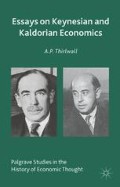Abstract
What made Kaldor so fascinating as an economist was his sparkling originality, his wide diversity of economic interests, and the many facets of his long and distinguished career which sometimes took him out of academic life into the public domain and into political controversy. Even within academe he was a controversial figure, holding unorthodox views on a variety of subjects. He was not only a first rate theorist and applied economist, but he was also involved in policy making at the highest level in the United Kingdom and in many other countries. Kaldor followed Keynes from King’s College to Whitehall, and they had many other characteristics in common. Both treated economics as a moral science—as a branch of ethics in the Cambridge tradition of Marshall, Pigou and Sidgwick—as a means to the end of attempting to make the world a more humane and civilised place. Both men shared the urge to protest against stupidity and injustice. Keynes described graphically in his Essay to the Memoir Club (Keynes, 1933) his own ‘impulse to protest, to write a letter to The Times, call a meeting in the Guildhall etc. etc. I behave as if there really existed some authority or standard to which I can successfully appeal if I shout loud enough.’ Kaldor was the most prolific letter writer to The Times of any economist this century, airing his views and leading campaigns on a wide variety of economic, social and political issues.
First published in Cambridge Journal of Economics, March 1989.
Access this chapter
Tax calculation will be finalised at checkout
Purchases are for personal use only
Preview
Unable to display preview. Download preview PDF.
Bibliography
Beveridge, W. 1942. Beveridge Report on Social Insurance and Allied Services, Cmnd. 6404, London, HMSO.
Beveridge, W. 1944. Full Employment in a Free Society, London, George Allen & Unwin.
Galbraith, J. K. 1981. A Life in Our Times, Boston, Houghton Mifflin.
Harrod, R. F. 1965, Economic Journal, December.
Hart, A., Kaldor, N. and Tinbergen, J. 1964. The Case for an International Commodity Reserve Currency, Geneva, UNCTAD.
HM Government 1972. Proposals for a Tax-Credit System, Cmnd. 5116, London, HMSO.
Kaldor, N. 1939. Principles of emergency finance, The Banker, August.
Kaldor, N. 1941. The White Paper on National Income and Expenditure, Economic Journal, June–September
Kaldor, N. 1942. The 1941 White Paper on National Income and Expenditure, Economic Journal, June–September.
Kaldor, N. 1943A. The Beveridge Plan’s real cost, Manchester Guardian, 10 and 11 February.
Kaldor, N. 1943B. The Beveridge Report II: the financial burden, Economic Journal, April.
Kaldor, N. 1945. The German war economy, Review of Economic Studies, vol 13, no. 1 (also in Manchester School, September 1946).
Kaldor, N. 1952. A Reconsideration of the Economics of the International Wheat Agreement, Commodity Policy Studies No. 1, Rome, FAO.
Kaldor, N. 1955. An Expenditure Tax, London, George Allen & Unwin.
Kaldor, N. 1964A. Stabilising the terms of trade of underdeveloped countries, Economic Bulletin for Latin America, March.
Kaldor, N. 1964B. Essays in Economic Policy I, Collected Economic Essays, vol. 3, London, Duckworth.
Kaldor, N. 1971. Conflicts in national economic objectives, Economic Journal, March.
Kaldor, N. 1980A. Tax credits: a critique of the Green Paper proposals, in Reports on Taxation I, Collected Economic Essays, vol. 7, London, Duckworth.
Kaldor, N. 1980B. The economic effects of alternative systems of corporation tax, in Collected Economic Essays, vol. 7, London, Duckworth.
Kaldor, N. 1980C. Reports on Taxation II, Collected Economic Essays, vol. 8, London, Duckworth.
Kaldor, N. and Barna, T. 1943. The 1943 White Paper on National Income and Expenditure, Economic Journal, June–September.
Kaldor, N. and Barna, T. 1944. The quantitative aspects of the full employment problem in Britain, Appendix C in Beveridge (1944).
Kaldor, N. and Joseph, M. F. W. 1942. Economic Reconstruction After the War, Association for Education Citizenship, English Universities Press.
Keynes, J. M. 1933. Essays in Biography, London, Macmillan.
Keynes, J. M. 1936. General Theory of Employment, Interest and Money, London, Macmillan.
Moggridge, D. (ed.) 1980. The Collected Writings of J. M. Keynes: Vol XXVII: Activities 1940–1946 Shaping the Post-War World: Employment and Commodities, London, Macmillan.
Thirlwall, A. P. 1987. Nicholas Kaldor, Brighton, Wheatsheaf Books.
UN Experts Committee 1949. Report on National and International Measures for Full Employment, Geneva, United Nations.
US Strategic Bombing Survey 1945. The Effects of Strategic Bombing on the German War Economy, Washington DC, US Strategic Bombing Survey.
Wilson, T. 1982. Planning for the war and for the peace, in Thirlwall, A. P. (ed.), Keynes as a Policy Adviser, London, Macmillan.
Author information
Authors and Affiliations
Copyright information
© 2015 A.P. Thirlwall
About this chapter
Cite this chapter
Thirlwall, A.P. (2015). Kaldor as a Policy Adviser. In: Essays on Keynesian and Kaldorian Economics. Palgrave Studies in the History of Economic Thought Series. Palgrave Macmillan, London. https://doi.org/10.1057/9781137409485_11
Download citation
DOI: https://doi.org/10.1057/9781137409485_11
Publisher Name: Palgrave Macmillan, London
Print ISBN: 978-1-349-48871-1
Online ISBN: 978-1-137-40948-5
eBook Packages: Palgrave Economics & Finance CollectionEconomics and Finance (R0)

